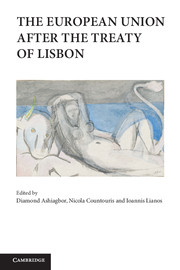Book contents
- Frontmatter
- Contents
- The European Union after the Treaty of Lisbon
- Introduction
- 1 The institutional development of the EU post-Lisbon
- 2 Competence after Lisbon
- 3 The Charter, the ECJ and national courts
- 4 Accession of the EU to the ECHR
- 5 EU citizenship after Lisbon
- 6 The law and politics of migration and asylum: The Lisbon Treaty and the EU
- 7 The European Union's common foreign and security policy after Lisbon
- 8 The European Ombudsman and good administration post-Lisbon
- 9 European contract law after Lisbon
- 10 Competition law in the European Union after the Treaty of Lisbon
- 11 The unexpected revision of the Lisbon Treaty and the establishment of a European stability mechanism
- Index
- References
5 - EU citizenship after Lisbon
Published online by Cambridge University Press: 05 June 2012
- Frontmatter
- Contents
- The European Union after the Treaty of Lisbon
- Introduction
- 1 The institutional development of the EU post-Lisbon
- 2 Competence after Lisbon
- 3 The Charter, the ECJ and national courts
- 4 Accession of the EU to the ECHR
- 5 EU citizenship after Lisbon
- 6 The law and politics of migration and asylum: The Lisbon Treaty and the EU
- 7 The European Union's common foreign and security policy after Lisbon
- 8 The European Ombudsman and good administration post-Lisbon
- 9 European contract law after Lisbon
- 10 Competition law in the European Union after the Treaty of Lisbon
- 11 The unexpected revision of the Lisbon Treaty and the establishment of a European stability mechanism
- Index
- References
Summary
Introduction
EU citizenship, so far at least, has been mostly effective as a legal construct. Its substance has emerged primarily through case law on the rights to free movement and residence, much of which has been codified in Directive 2004/38. The other Treaty provisions linked expressly to EU citizenship outline a number of political rights, including municipal and European Parliament electoral rights.
The Lisbon Treaty did not engage radically with these formal aspects of EU citizenship. There has been some restructuring to create what is now Part Two of the Treaty on the Functioning of the European Union (TFEU), making an express linkage between the prohibition on nationality discrimination, action to combat other forms of discrimination, and the primary rights of EU citizenship. In most substantive respects, the Treaty rights already attached to EU citizenship are reproduced in Articles 20–25 TFEU, although there are some innovations too. The first part of this chapter goes through relevant Treaty on European Union (TEU) and Treaty on the Functioning of the European Union (TFEU) provisions and outlines any changes effected through the adoption of the Lisbon Treaty.
- Type
- Chapter
- Information
- The European Union after the Treaty of Lisbon , pp. 136 - 155Publisher: Cambridge University PressPrint publication year: 2012



